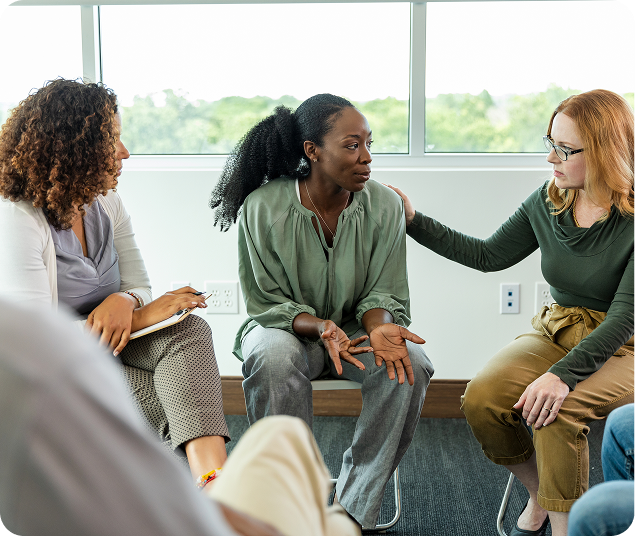Bereavement Support Groups in Massachusetts
Grief doesn’t follow a schedule. Some days it feels like a steady ache; other days it hits in waves. You don’t have to navigate it alone. Our clinician-facilitated bereavement support groups offer a consistent space to share, learn coping skills, and reconnect with what matters, at your own pace.
Facilitated by licensed clinicians • In-person at our outpatient center and via secure telehealth across Massachusetts.
How Our Grief Support Groups Work

Who The Groups Are For
Adults (18+) in Massachusetts grieving a recent or long-ago loss.
People who have lost a spouse or partner, parent, child, relative, friend, or colleague
Anyone navigating sudden or traumatic loss (including accidents, suicide, or substance-related causes).
Caregivers coping with anticipatory grief or cumulative losses.
No referral is typically required; our Admissions team can guide you. During a short intake call, we’ll help you decide whether a group, individual therapy, or a combination is the right next step for you.

What Sessions Cover
Each group blends gentle sharing with practical skills you can use between meetings. Common themes include:
Understanding how grief shows up, emotionally, physically, and in daily routines.
Building coping rituals for tough moments (anniversaries, holidays, sudden reminders).
Strategies to stabilize sleep and appetite.
Mindfulness and grounding tools to ride the “grief waves.”
Communication skills for friends, family, and employers.
Meaning-making: remembering your person, honoring your values, and re-engaging with life.
No one is pressured to speak before they’re ready; you can participate at your own pace.
Our Clinical Approach
Our groups are led by licensed clinicians who integrate evidence-based therapies into a compassionate, peer support setting. You’ll see these approaches woven into plain-language exercises and handouts, no jargon required.

.png)
CBT for thoughts, routines, and meaning-making
Cognitive Behavioral Therapy (CBT) helps identify thought loops that often follow loss (“I should be over this,” “If I distract myself, I’m forgetting them”). We practice skills to:
Notice and soften harsh self-talk.
Rebuild daily routines that support sleep, nutrition, and connection.
Take small, values-based steps toward activities that matter to you.
.png)
DBT Skills for Intense Emotion Waves and Triggers
Loss can bring surges of emotion. Dialectical Behavior Therapy (DBT) skills provide a toolkit you can reach for in the moment:
Distress tolerance: quick, safe techniques for acute spikes in pain.
Emotion regulation: understanding the body’s signals and reducing “emotional whiplash.”
Interpersonal effectiveness: asking for help, setting boundaries, and staying connected without pressure.
.png)
EMDR When Loss Is Traumatic
For some people, the hardest part of grief is the trauma surrounding the death. EMDR (Eye Movement Desensitization and Reprocessing) can help lessen the intensity of traumatic memories and triggers.
If you and your clinician agree it’s appropriate, we can discuss EMDR in individual therapy alongside your group participation, always at your pace and never as a guarantee of a specific outcome.
Group, Individual Therapy, OP & IOP, Finding the Right Level
When a Support Group May Be Enough

When to Add 1:1 Therapy or Adjust Your Level of Care
Access Across Massachusetts
.png)
In-Person At Our Outpatient Center
Prefer to be in the room? We host groups in a calm, comfortable setting designed to feel welcoming and private. You’ll receive details on parking, arrival, and what to expect when you schedule.
.png)
Telehealth Statewide
If you’re anywhere in Massachusetts, or if getting here is difficult, telehealth groups let you participate from home using a secure, HIPAA-compliant platform. We’ll walk you through a short tech check before your first session and share privacy tips for joining from a private space.
.png)
Scheduling That Respects Real Life
We aim to offer options that work around job and family schedules. If our current groups don’t fit, ask about upcoming series or joining the interest list for future times.
What to Expect from Intake
A Simple, Confidential Screening
Your first step is a brief, confidential call with our Admissions team. We’ll talk about what you’re going through, answer questions, and recommend the best fit group (and whether to add individual therapy). If you choose to start, we’ll confirm logistics and your start date.
Fees & Insurance
.png)
.png)
.png)
When Grief Feels Stuck (Signs to Notice)
It’s been many months, and your daily functioning remains significantly disrupted.
You feel numb, detached, or overwhelmed most of the time.
You avoid reminders so intensely that life keeps getting smaller.
Sleep and appetite are persistently off, or anxiety and depression are intensifying.
You have thoughts of harming yourself or hopelessness that feel scary.
.jpg)
Frequently Asked Questions
What’s the difference between a grief support group and group therapy?
How long does the group run, and can I join mid-series?
Are the groups virtual, in person, or both?
Who facilitates the group? Are they licensed clinicians?
Do I need a referral?
How does payment work if you’re out-of-network?
What if I’m not ready to speak in a group?
Where else can I find community resources?
Take the Next Step Now!
You don’t have to do this alone. Whether you prefer a quiet seat in the room or a secure telehealth group from home, we’ll help you find a starting point that respects your capacity and your privacy.





